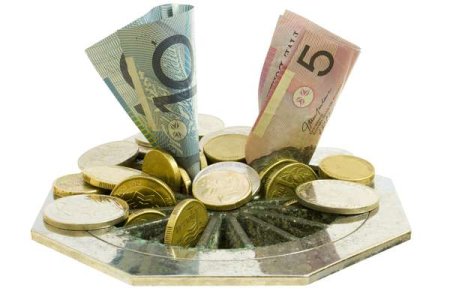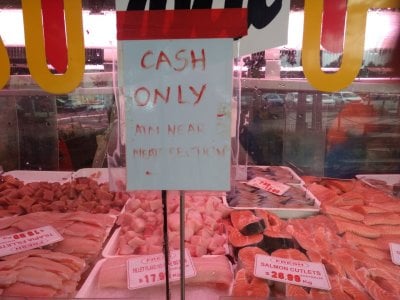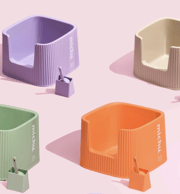Cash is king: Aussie mum's retro money-saving trick wins financial expert’s stamp of approval
- Replies 6
In an era where digital transactions are swiftly becoming the norm, it's refreshing to hear a tale of financial wisdom that harks back to simpler times.
Recently, a simple yet effective money-saving strategy has garnered praise, particularly among Australian mums. This innovative approach, highlighted by financial experts, underscores the practical ways individuals can enhance their budgeting skills.
As more people seek practical financial advice, such strategies resonate widely, offering insights into managing expenses and achieving financial goals with ease.
Rita, an Australian mum-of-three, received a nod of approval from none other than the Barefoot Investor, Scott Pape, for her straightforward yet effective money-saving strategy at the checkout.
However, as Pape warned, those keen to adopt this method might need to act swiftly as the landscape of currency is changing.

Rita, who found herself navigating the financial challenges of raising three children alone, shared her story with Pape in a letter published in the Herald Sun.
In 2017, after finding herself newly single with three children, Rita took up house cleaning for three affluent clients who paid her in cash.
This experience led her to a revelation: cash is king.
Rita adopted a cash-only policy for all her expenses, including rent and groceries, staunchly avoiding the use of cards at the checkout.
She discovered that this approach not only saved her from the surcharge fees often associated with card payments but also greatly assisted her in adhering to a strict budget during a tumultuous period of her life.
‘I am convinced it not only saved me hundreds of dollars in surcharge fees that you wrote about last week but also helped me keep to a budget during an extremely stressful time of my life,’ Rita explained in her letter.
After many years, she still abides by this advice.
‘To this day (seven years on), I still withdraw my spending money each week in $50 and $20 notes. Life is simple with cash!’ she shared.
Scott Pape responded to Rita's letter with praise, saying, ‘You worked out for yourself what a bunch of PhDs from the University of Melbourne and University of Adelaide concluded after analysing data from 11,000 participants.’
‘It doesn’t matter whether you use a credit card, a debit card or a buy-now-pay-later service—you are likely to spend more money using cashless methods than when you pay with cash.’
However, Pape also cautioned that the use of cash is dwindling.
‘Cash is going the way of Kevin Rudd. (It pops up every so often just to let us know that it’s still relevant, only to fade back into oblivion),’ Pape warned.
‘Cash is now only used for 16 per cent of transactions, and you can bet your shiny ‘lil fitty that the Commissioner of Taxation is the main one cheering on its demise.’
‘After all, the ATO’s supercomputer has so much data on you it would make Mark Zuckerberg drool (and it’s only getting more powerful with artificial intelligence).’
‘Yet, for all its computing power, it’s still no match for a single mum with a dustbuster,’ he added.
As Australians increasingly rely on plastic payments and cash usage declines, banks have responded by shuttering branches and, in some cases, phasing out cash altogether.
Debit card expenditures nationwide have reached $581 billion, while credit transactions amounted to $418 billion, based on the Australian Banking Association's analysis of transaction trends for the year ending March 2024.
According to Reserve Bank figures, cash transactions constituted about 70 per cent of all transactions in 2007, but by late 2022, this figure had plummeted to only 13 per cent.
‘The share of in-person transactions made with cash halved over the three years to 2022,’ RBA’s most recent Consumer Payments Survey found.
‘Cash is now used less than electronic methods for all transaction sizes. The demographic groups that traditionally used cash more frequently for payments—such as the elderly, those on lower incomes and those in regional areas—saw the largest declines in cash use.’
This reflects a growing trend towards practical financial management in everyday life.
Meanwhile, amidst the surge in digital payments and declining cash usage, many Australians are questioning the implications of a cashless society.
The resistance to fully embracing digital payments underscores ongoing concerns and preferences that continue to shape consumer behaviour and financial habits in Australia.
 Have you found that using cash helps you control your spending? Or have you embraced the convenience of digital payments? Share your experiences and thoughts in the comments below.
Have you found that using cash helps you control your spending? Or have you embraced the convenience of digital payments? Share your experiences and thoughts in the comments below.
Recently, a simple yet effective money-saving strategy has garnered praise, particularly among Australian mums. This innovative approach, highlighted by financial experts, underscores the practical ways individuals can enhance their budgeting skills.
As more people seek practical financial advice, such strategies resonate widely, offering insights into managing expenses and achieving financial goals with ease.
Rita, an Australian mum-of-three, received a nod of approval from none other than the Barefoot Investor, Scott Pape, for her straightforward yet effective money-saving strategy at the checkout.
However, as Pape warned, those keen to adopt this method might need to act swiftly as the landscape of currency is changing.

Barefoot Investor commended Aussie mum Rita for her straightforward savings method of using cash for all expenses, including rent and groceries. Credit: Shutterstock
Rita, who found herself navigating the financial challenges of raising three children alone, shared her story with Pape in a letter published in the Herald Sun.
In 2017, after finding herself newly single with three children, Rita took up house cleaning for three affluent clients who paid her in cash.
This experience led her to a revelation: cash is king.
Rita adopted a cash-only policy for all her expenses, including rent and groceries, staunchly avoiding the use of cards at the checkout.
She discovered that this approach not only saved her from the surcharge fees often associated with card payments but also greatly assisted her in adhering to a strict budget during a tumultuous period of her life.
‘I am convinced it not only saved me hundreds of dollars in surcharge fees that you wrote about last week but also helped me keep to a budget during an extremely stressful time of my life,’ Rita explained in her letter.
After many years, she still abides by this advice.
‘To this day (seven years on), I still withdraw my spending money each week in $50 and $20 notes. Life is simple with cash!’ she shared.
Scott Pape responded to Rita's letter with praise, saying, ‘You worked out for yourself what a bunch of PhDs from the University of Melbourne and University of Adelaide concluded after analysing data from 11,000 participants.’
‘It doesn’t matter whether you use a credit card, a debit card or a buy-now-pay-later service—you are likely to spend more money using cashless methods than when you pay with cash.’
However, Pape also cautioned that the use of cash is dwindling.
‘Cash is going the way of Kevin Rudd. (It pops up every so often just to let us know that it’s still relevant, only to fade back into oblivion),’ Pape warned.
‘Cash is now only used for 16 per cent of transactions, and you can bet your shiny ‘lil fitty that the Commissioner of Taxation is the main one cheering on its demise.’
‘After all, the ATO’s supercomputer has so much data on you it would make Mark Zuckerberg drool (and it’s only getting more powerful with artificial intelligence).’
‘Yet, for all its computing power, it’s still no match for a single mum with a dustbuster,’ he added.
As Australians increasingly rely on plastic payments and cash usage declines, banks have responded by shuttering branches and, in some cases, phasing out cash altogether.
Debit card expenditures nationwide have reached $581 billion, while credit transactions amounted to $418 billion, based on the Australian Banking Association's analysis of transaction trends for the year ending March 2024.
According to Reserve Bank figures, cash transactions constituted about 70 per cent of all transactions in 2007, but by late 2022, this figure had plummeted to only 13 per cent.
‘The share of in-person transactions made with cash halved over the three years to 2022,’ RBA’s most recent Consumer Payments Survey found.
‘Cash is now used less than electronic methods for all transaction sizes. The demographic groups that traditionally used cash more frequently for payments—such as the elderly, those on lower incomes and those in regional areas—saw the largest declines in cash use.’
This reflects a growing trend towards practical financial management in everyday life.
Meanwhile, amidst the surge in digital payments and declining cash usage, many Australians are questioning the implications of a cashless society.
The resistance to fully embracing digital payments underscores ongoing concerns and preferences that continue to shape consumer behaviour and financial habits in Australia.
Key Takeaways
- An Australian mum received praise from the Barefoot Investor for her simple savings trick of using cash for all purchases, including rent and groceries.
- Rita, a mum of three, claimed that paying in cash helped her avoid surcharges and stick to a budget during a challenging financial period.
- Financial expert Scott Pape acknowledged her strategy, noting research supports the notion that people spend more when using cashless methods compared to cash.
- The use of cash is declining in Australia, with only 16 per cent of transactions made with cash as electronic payments become the norm and banks close physical branches.








